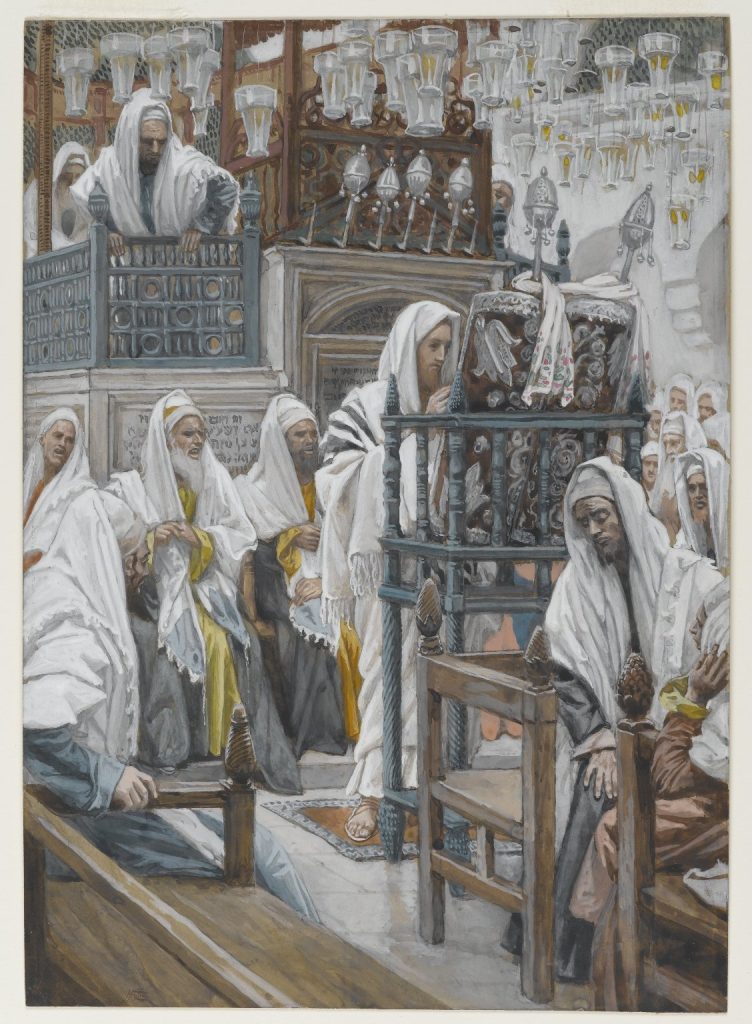The Posture of Gratefulness
There’s a lot going on when Jesus stands up to read the Scriptures in the synagogue, his hometown of Nazareth, in the fourth chapter of the Gospel according to Luke.
Of most significant importance for Luke’s agenda is that his readers recognize that Jesus is the greatest among the teaching and miracle-working prophets of all time. The depth of his wisdom and the wonder of the miracles that he makes happen has everyone in Nazareth’s attention. Of equal importance for Luke, however, is that we understand that, like the greatest prophets of the Hebrew scriptures, Jesus of Nazareth will also suffer profound rejection. Indeed, by the end of this account, Jesus will barely escape with this life! The wondrous irony of Jesus’ ministry is that it is precisely this rejection that will be the means by which he accomplishes his mission of the restoration of all creation. He offers himself to this rejection death so that in his resurrection, he might be the victor over that death.
But in this all there is the peculiar dynamic present because Jesus is speaking in his hometown as an increasingly famous person. He’s been invited to read and then comment on the scriptures. This is not an unusual practice for a synagogue of the time, to have a visitor of note offer a word. But it becomes evident that the folks at home expect more from the local guy who seems to be making good. From Jesus’ hard-driving diagnostic comments following his unequivocal declaration that he is the fulfillment of the ancient promises made through the prophet Isaiah, we discover that the people of Nazareth expect some special favor because they are the hometown crowd.
It might seem harsh that Jesus rejected this claim, but the reason for the rejection is embedded in his proclamation of good news.
It is to be proclaimed to the poor.
This promise that the poor receive fulfillment by the hand of God is all over the scriptures. It’s a central theme in Mary’s song from three chapters earlier. This divine blessedness is not intended as a consolation prize or a strategy to get even with the exploitative rich; instead, it’s an insight into the place of all creation (including humans) before God’s unmerited generosity. It is an invitation, especially for well-positioned people like the folks in Nazareth or affluent people such as us, to a posture of gratefulness.
This encounter at Nazareth helps shine a light on this dynamic. Some of the people at Nazareth, as the hometown folk, believe that they have a kind of claim on Jesus. But he flatly rejects their claim of privilege. Jesus comes proclaiming good news to the poor because unlike riches or success or strength, poverty, failure, and weakness are accessible to everyone. We may prefer not to think about it, but our frailty in life is undeniable, and our poverty before the wonders of the created cosmos is self-evident. The best posture to have before the God who loves us so much that he gives even himself is the posture of openhanded, humble gratefulness. Sometimes our life circumstances teach us of our own poverty the hard way.

This painting by the 19th-century French painter James Tissot is part of a larger body of work – over 300 paintings made to illustrate the Gospels. In 1882, he lost the love of his life, Kathleen Newton, to tuberculosis. This death sent the successful society painter into a tailspin of grief. His biographers tell us that following a successful 1885 show in Paris, he experienced a vision of Christ on the cross while visiting a Parisian church. As a result of this experience, he resolves to spend the rest of his career painting historically accurate scenes from the gospels. He makes two trips to Palestine to research the customs and geography of the Middle East. You can see in his attention to the detail of the robes worn by Jesus and the rest that his experience painting wealthy women in fine clothes translated to this new calling.
This depiction of Jesus teaching in the synagogue of Nazareth gives us a snapshot of what this encounter with the miracle-working and rejected profit might have looked like.
Pr. Jim
Rev. Katherine Museus and Rev. James A. Wetzstein serve as university pastors at the Chapel of the Resurrection at Valparaiso University and take turns writing weekly devotions.
September 10, 2024
- James Wetzstein
- The Wonder of Resurrection
- Forgiveness: The Necessary Miracle
- Everything Happens for a Reason or Does It?
- Of Groundhogs and Divine Love
- When You Pass Through the Fire…
- KHESED
- Psalm 46 – When There’s Trouble, God Can Always Be Located
- Who Are Your Beatitudes Mentors?
- The Posture of Gratefulness
- Like a Mirror of Eternal Truth
- “Light” and Other “L” Words
- Keeping Up with the Holy Spirit
- It’s a Three Day Weekend!
- Divine Love Can’t Quit You
- I Had a Bit of a Moment
- What to do When Our Resolutions Don’t Deliver
- Have Yourself a Merry Little Christmas (Somehow)
- Adventing in the Meantime
- Life and Death Collisions
- Imagining Eternity
- Where is God for You?
- All You Need Is Love, Love Is All You Need
- God Uses Crooked Sticks to Draw Straight Lines
- “Reset/Refresh” Sabbath as rest, not distraction